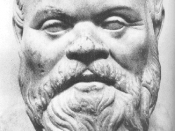No single person is considered to have had more of an influence on the course of modern philosophy, as well as general intellectual inquiry, than Frenchman Rene Descartes (1596-1650) (Grafton 36). Descartes' philosophy did more than any other to redirect philosophy toward conclusions based on empirical study (Grafton 36). In his famous work Meditations on First Philosophy, Descartes considers the existence of God in Meditation III. Drawing on what he intuits to be true of his own mind and perception, Descartes arrives at the conclusion that God's existence is undeniable.
In the meditations preceding Meditation III, Descartes argued that the compendium of human knowledge that he had acquired thus far in his life could not be trusted, since that knowledge was based on sensory information, which he showed to be unreliable. Therefore, Descartes comes to the conclusion that his own mind is the only thing of which he can be sure.
As he begins Meditation III, Descartes describes himself as "a thing that thinks." While Descartes grants that what he perceives or imagines may be nothing apart from himself, he is nevertheless assured that his perceptions, his "modes of thought," reside within him.
From this, Descartes proceeds to argue that an idea is an effect, that something outside of the mind caused that effect. For example, the idea of a stone originates from the perception of a stone. Since ideas are effects, Descartes stipulates that the cause of the effect must possess as much reality as the effect. Furthermore, Descartes asserts that any cause must have as much perfection as its effect. The idea of God, he reasons, must come into being in a similar manner. Therefore, the cause of his idea, i.e. God, must possess as much reality and perfection has his idea of God, which is the...


